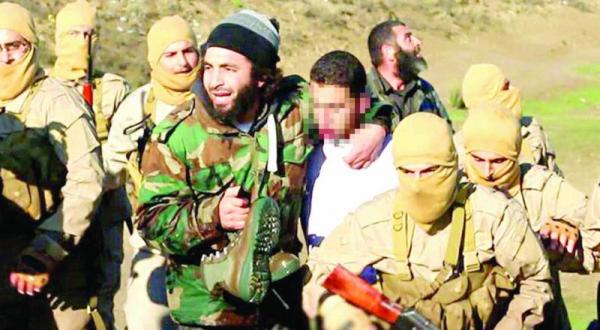As ISIS holds its pilot prisoner, what can Jordan do?
Friday, 26 December 2014
Raed Omari /Al Arabiya
The anti-ISIS alliance member Jordan is not in an enviable situation. One of the kingdom’s F16 pilots, Maaz al-Kassasbeh, is now a prisoner of radical militants from the Islamic State of Iraq and Syria. It is the worst-case scenario participation in the U.S.-led war against ISIS could have brought about. To be at the forefront of the anti-terror efforts and to have reasons for second thoughts is the real challenge Jordan is facing today.
ISIS’s capture of the pilot following the crash of the 26-year-old’s F16 warplane in northern Syria brings into spotlight many challenging questions on what Jordan can do to ensure the release of its pilot and also on the nature of the Jordan-ISIS relationship considering Jordan’s leading role in the anti-terror war which is now a major pillar in Amman’s foreign and domestic policy.
Whilst silence, uncertainty and sadness are the major feelings prevailing in Jordanian society over the capture of Maaz al-Kassasbeh, “our brave Maaz”, amidst call by the government on media outlets to deal with the issue with complete responsibility and secrecy, there is a now talk of a prisoner swap with ISIS as the only possible way for Jordan to ensure the release of al-Kassasbeh.
“Jordan can resort to prisoner swaps with ISIS”
Raed Omari
Fully aware of what it means to be a prisoner of ISIS, all Jordanians now pray for the safety of al-Kassasbeh; all including those very few who believe in the alluring “Caliphate” of ISIS. In a message of appeal to ISIS, Maaz’s father, Yusuf al-Kassasbeh, called on ISIS to treat his son decently. The aggrieved father also urged Jordanian King Abdullah to do his best to save his 26-year-old son. Yusuf was said to have received a phone call from the Jordanian army telling him: “We are currently working to save [your son’s] life. The king is concerned to save his life.”
Tremendous efforts
No doubt, tremendous efforts are being exerted now by the Jordanian authorities to ensure the release of al-Kassasbeh. They are probably in the form of intelligence more than diplomatic efforts, needless to mention why. With nothing being said about the nature of such efforts, a prisoner swap with ISIS could be Jordan’s best way to bring al-Kassasbeh back home. In my opinion, such a move would not be that embarrassing to Jordan although it is an active member in the U.S.-led anti-ISIS alliance.
Yes, Jordan can resort to prisoner swaps with ISIS. Turkey has done it before to ensure the release of 49 Turkish consular stuff that ISIS captured when it overran the Iraqi city of Mosul in June in exchange for 180 captured militants. Although the Turkish membership in the anti-ISIS coalition is nothing to compare with the overt Jordanian participation, it can be an option. Turkey is perhaps still a supporting member and Jordan can be too. There are voices in Jordan now advising the government to seek regional mediation with ISIS over the release of al-Kassasbeh, citing similar mediating efforts with ISIS and Jabhat al-Nusra.
Certain names
But who are those prisoners that Jordan can free in exchange for its pilot? There are certain names that are mentioned whenever there is a talk about a possible prisoner swap with ISIS, including Sajida al-Rishawi, the Iraqi woman who was captured in connection with a failed suicide bombing of one of the hotels of Amman in 2005. ISIS might request the release of Sajida if ISIS is indeed originated from the remnants of the al-Qaeda in Iraq group to which al-Rishawi was supposedly affiliated. Other names mentioned are the jailed militant Ziad Raja al-Karbouli (aka Abu Houthiyfah), who was accused in 2007 of leading a group of militants in plotting attacks on trucks with Jordanian license plates on Iraqi roads, although he denies this. Another name mentioned is Jordanian Muammar al-Jaghbir, who was sentenced to death in 2002 for the murder of a U.S. diplomat, but whose sentence was then commuted to 15 years.
Within the context of the Jordanian hostage crisis, there is also a talk about a military operation being prepared by the Jordanian commandos to free Maaz al-Kassasbeh. News reports are being cited in such talk. However, similar U.S. Special Forces operations have failed in Yemen, Syria and Somalia to free American prisoners from ISIS and al-Qaeda.
All in all, the situation in Jordan is no doubt difficult again with regard to the kingdom’s membership in the anti-ISIS coalition and its leading role in the war against terror. However, Jordan can resort to prisoner swap with ISIS if such can guarantee the safety of Maaz al-Kassasbeh. In doing so, Jordan can respond to growing voices in the kingdom questioning their country’s participation in “Washington’s war” against ISIS.




















